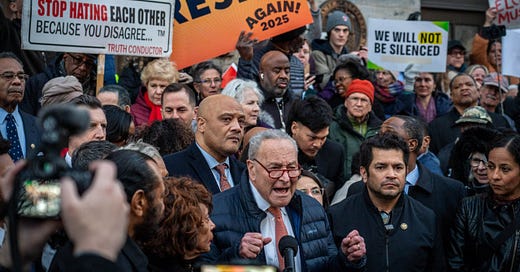Gassy Politics
First: Paul Sabin’s stupid op-ed in The New York Times Saturday shows how intellectually bankrupt and pusillanimous the “newspaper of record” has become, in step with the depraved and decadent empire whose record-keeper it supposedly pretends to be. Sabin is flame-keeper for the theories of the late cornucopian demi-god Julian Simon, a business school professor whose great idea stokes the wishful thinking that has overtaken a class of American leaders who ought to know better, and spread through the public they serve like a fungal infection of the brain. The core of Julian Simon’s great idea is that material resources don’t matter; human ingenuity will overcome all limits.
Maybe that’s a temporarily comforting thought for leaders in business, media, and politics, who don’t want to face the realities of peak resources and climate change, but it guarantees a harsher economic outcome since the wishful public will do nothing to prepare for the very different terms of daily living that are already shoving them into hardship and desperation.
Julian Simon, who died in 1998, is best remembered now for a bet he made in 1980 with biologist Paul Ehrlich, author of The Population Bomb. The bet was supposed to determine whether the converging difficulties of our time should be taken seriously. The two men picked a menu of commodity metals and bet whether the price would rise or fall by 1990. Ehrlich bet that scarcity would drive the price up; Simon bet that they would go down. Simon won the bet only for temporary circumstantial reasons, namely that the last great discoveries of cheap, easy-to-get oil ramped into full production by the mid-1980s and pushed a final orgy of global industrial development until 2008, when things really started falling apart. By then, Julian Simon has been dead for a decade.
Simon’s idea lives on in the wishful thinking around shale oil and gas, which have led the American public and their leaders to believe that we’re in an “energy renaissance” that will lead to “energy independence.” Just the other day, Senator John McCain made the inexcusably dumb remark that the US is now a net oil exporter. This is a man who ran for president five years ago, talking completely out of his ass.
Now oil is well over $100 a barrel, a price that the American economy, as currently configured, cannot endure. That price is crushing the kind of activity we have depended on lately: the house-building and lending rackets associated with the creation of suburban sprawl. $100 oil is especially corrosive to the problems of capital formation, because without more racket-driven “growth,” we can neither generate new credit, nor pay the interest on old credit. We’ve used accounting fraud in banking and government to cover up this failed equation. But it has only led to greater deformities in markets and a general fiasco in the management of money all around the world, and it is spinning out of control right now. If these conditions were to crash the global economy and the price of everything fell in a deflationary depression, with oil back under $60 a barrel — then it would not pay enough to frack the shale rock, or drill miles under the ocean, or do any of the very expensive operations of what’s called unconventional oil recovery.
For The New York Times to keep hauling out the sorry-ass figure of Julian Simon to “prove” a specious and dangerous point surely shows the limits of one thing: intelligence in the media. Because of that and other related failures in the transmission of ideas, this is now a nation that cannot construct a coherent narrative about what is happening to it.
Now, second: Syria. The world has pretty much lined up against President Obama’s proposal to issue a cruise missile spanking to Syria for supposedly gassing its own citizens. Nobody thinks this is a good idea, some for reasons of tactical advantage and some on the idea’s basic merit, or lack of. Mr. Obama pulled his punch over a week ago by standing down and taking the issue to congress for approval. I’m convinced he did that because he would have been impeached for launching an overt act of war — despite similar actions by his recent predecessors. The proposed spanking was a bad idea from the start. There was no visible threat to the national interest from Syria’s bad behavior within its own borders. The gas attack was a terrible act of depravity, but firing missiles into Syria wasn’t going to bring back the dead. It was only going to cause more death. There’s no advantage to the US for supporting either side in the Syrian civil war. The spread or deepening of any kind of disorder in that region will threaten a critical portion of America’s oil imports.
In the background of this, things are becoming unstuck in the seriously ill and constipated realm of international banking. The aforementioned deformities caused by central bank interventions, market manipulations, Too Big To Fail carry-trade rackets, and misreporting of financial data have begun to shred currencies in nations at the margin (India, Brazil, Indonesia) and that illness may prove contagious. The global economy depends on some basic faith that major financial institutions are sound, and that they trade in sound instruments that represent real wealth. That is all being called into question now, and how long will it be before a general paralysis freezes the entire letters-of-credit system that underlies global commerce?
The Syria soap opera has also managed to upstage the imminent mud-wrestling match between congress and the executive branch over the national debt limit and related matters of government spending. These problems appear for now to be completely intractable. If the government overcomes the latest version of this recurring dilemma, it will only be due to generating even more layers of accounting fraud to an already well-papered piñata that is just waiting to be smashed. While this goes on, the American public gets pushed deeper and deeper into a financial abyss, haunted by re-po men, lying bank officers, verminous lawyers, and chiseling hospital administrators.
All this is a recipe for a political explosion. What happens if the US Government starts gassing its own citizens? It happened in 1967. That one only made people cry. Maybe next time, they’ll use a different kind of gas.
This short, charming book will make you laugh (click here to buy)










